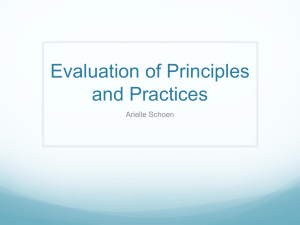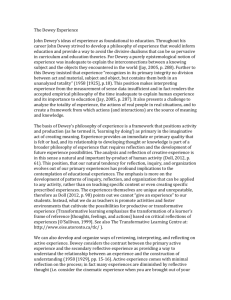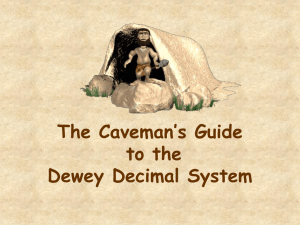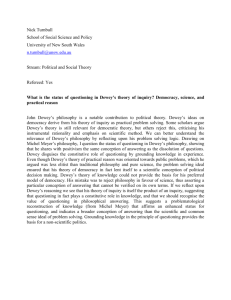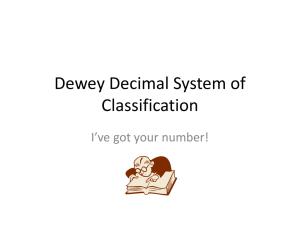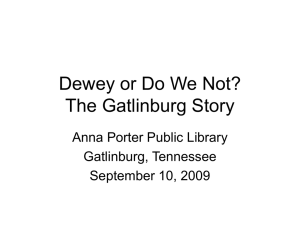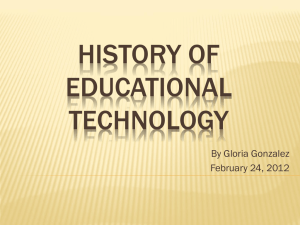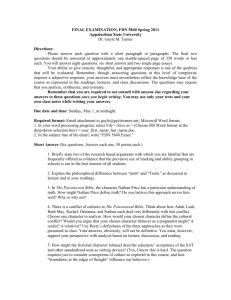Hogan
advertisement
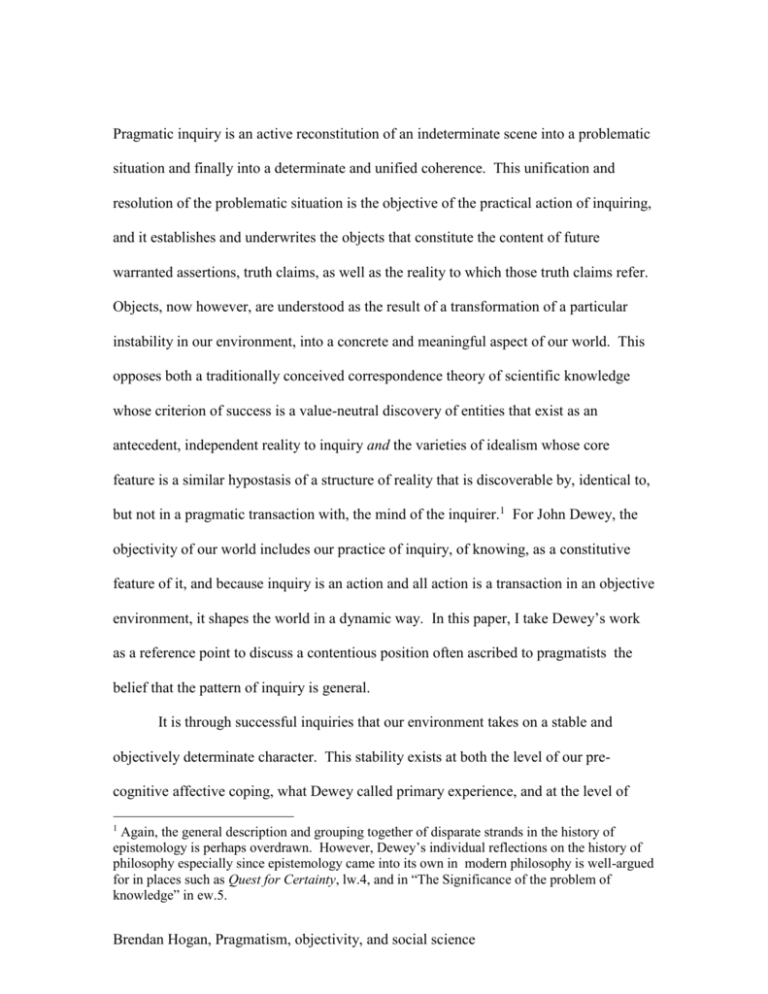
Pragmatic inquiry is an active reconstitution of an indeterminate scene into a problematic situation and finally into a determinate and unified coherence. This unification and resolution of the problematic situation is the objective of the practical action of inquiring, and it establishes and underwrites the objects that constitute the content of future warranted assertions, truth claims, as well as the reality to which those truth claims refer. Objects, now however, are understood as the result of a transformation of a particular instability in our environment, into a concrete and meaningful aspect of our world. This opposes both a traditionally conceived correspondence theory of scientific knowledge whose criterion of success is a value-neutral discovery of entities that exist as an antecedent, independent reality to inquiry and the varieties of idealism whose core feature is a similar hypostasis of a structure of reality that is discoverable by, identical to, but not in a pragmatic transaction with, the mind of the inquirer.1 For John Dewey, the objectivity of our world includes our practice of inquiry, of knowing, as a constitutive feature of it, and because inquiry is an action and all action is a transaction in an objective environment, it shapes the world in a dynamic way. In this paper, I take Dewey’s work as a reference point to discuss a contentious position often ascribed to pragmatists the belief that the pattern of inquiry is general. It is through successful inquiries that our environment takes on a stable and objectively determinate character. This stability exists at both the level of our precognitive affective coping, what Dewey called primary experience, and at the level of 1 Again, the general description and grouping together of disparate strands in the history of epistemology is perhaps overdrawn. However, Dewey’s individual reflections on the history of philosophy especially since epistemology came into its own in modern philosophy is well-argued for in places such as Quest for Certainty, lw.4, and in “The Significance of the problem of knowledge” in ew.5. Brendan Hogan, Pragmatism, objectivity, and social science reflection, secondary experience. Thus, Dewey ties the objectivity of our knowledge claims not only to this pragmatic fallibilist theory of inquiry but also to our lived experience. Scientific achievements find their ultimate warrant in filtering ‘down’ from a highly specialized scientific status to what Dewey refers to as ‘common sense’.2 Reality as known is dynamic and knowledge impacts our real experience in a meaningful way. This indeed is the instrumental criteria of knowledge: That “knowledge” has many meanings follows from the operational definition of conceptions. There are as many conceptions of knowledge as there are distinctive operations by which problematic situations are resolved. When it is asserted that reflective knowledge as such is instrumental, it is not meant that there is an a priori form of non-reflective knowledge, one which is immediately given. What is signified is that there is a direct possession and enjoyment of meanings to be had in that experience of objects which issues from reflective knowledge. It is futile to argue whether the conclusions of reflective method as such or the eventual objects enriched in meaning which are capable of direct perception and use more truly deserve the title of knowledge. It is congenial to our idiom to call the reflective conclusions of competent methods by the name of science. But science thus conceived is not a final thing. The final thing is appreciation and use of things of direct experience. These are known in as far as their constituents and their form are the result of science. But they are also more than science. They are natural objects experienced in relations and continuities that are summed up in rich and definite individual forms. QFC, lw.4.177 emphasis mine This criterion is also its weakness. Our knowledge claims are intrinsically dependent for their warrant upon their practical effects in future contexts, their meaningful consequences. There are no fixed rules of application or attribution of warrant ahead of any situation. Warrant and justification become an ongoing affair. However, if this pattern is to be truly general questions arise needing an answer. For example, “What is the proper relationship between the agent-inquirer and the indeterminate situation when the indeterminacy is constituted through the interactions of human society (or more strictly put human sociality)? How do we proceed when an See the last stage of the “Pattern of Inquiry” for this process, LTI, lw.12.118 as well as his overall discussion earlier in the same text, “Common Sense and Scientific Inquiry”, LTI, lw.12.68 ff. 2 Brendan Hogan, Pragmatism, objectivity, and social science object of inquiry is a human being, their community, and their behavior?” What is Dewey’s understanding of inquiry into social or cultural phenomena? Would Dewey, for instance, accept the neopragmatist Richard Rorty’s attribution of the following view to him to the effect that in social science If you can’t figure out the relation between a person, the noises he makes, and other persons, then you won’t know much about him. But one could equally well say that fossils wouldn’t’ be fossils, would be merely rocks, if we couldn’t grasp their relations to lots of other fossils. Fossils are constituted as fossils by a web of relationships to other fossils and to the speech of the paleontologists who describe such relationships. If you can’t grasp some of these relationships, the fossil will remain to you, a mere rock. Anything is for purposes of being inquired into, “constituted by a web of meanings”.? 3 Surely a stronger distinction between the natural and social sciences must find its way into the general pattern of inquiry Dewey articulates. Otherwise he is in danger of promoting a type of materialist reductivism that he distanced himself from, and undermined the presuppositions of, at various stages in his career4. In a typical Richard Rorty “Social Method and Social Hope” in Consequences of Pragmatism, University of Minnesota Press, Minneapolis, 1982, p. 201. 4 See “Experience Knowledge and Value: a rejoinder” esp. lw.14.87, and “Are Naturalists Materialists?” lw.15.112 ff. In the former Dewey discusses the relation of naturalism and materialism, ultimately undermining the presuppositions that ‘matter’ is the actual isolable, general ‘stuff’ that reductive materialists take it to be. In the latter he writes: To speak of the mental as being "wholly at the beck and call" of the physical suggests a degrading status for the mental, a slavish helplessness, which outrages our sense of fact. Physical processes, on any but a magical view of things, do not beckon or call--only human beings do. If there is a suggestion here that the properties of organized matter on any level must be read back into matter organized on any other level, then as already indicated naturalists do not subscribe to such notions of the physical. Second, if the point of these questions rests on a conception of minds as substantial but ethereal entities, capable nevertheless of controlling or being controlled by physical substances, naturalists will dismiss the questions as not addressed to themselves: they simply do not subscribe to such notions of the mental. Also, [W]hatever may be said for reductive materialism--and very little can be said in its favor-it can be categorically asserted that it is not a view which is professed, either tacitly or explicitly, by the naturalists whom Mr. Sheldon is criticizing. If "materialism" means reductive materialism, then those naturalists are not materialists. lw.15.114 Here Dewey includes himself as one of the naturalists to whom Sheldon refers. 3 Brendan Hogan, Pragmatism, objectivity, and social science statement regarding just this topic, one that speaks against Rorty’s misreading above, Dewey writes “It is a fact rather than a speculation that physical and animal nature are transformed in the process of education and of incorporation in the means and consequences of associated political, legal, religious, industrial, and scientific and artistic institutions.” IPI, lw.3.53. The extent of this transformation will require positing a distinct difference in the understanding of human action and the web of human meanings and relationships as opposed to merely biological or physico-chemical behavior, between social scientific and natural scientific inquiry. Our access to, and participation in, social inquiry employs different functions of imagination in addition to those employed in natural scientific inquiry. Rorty’s reading of Dewey’s with respect to the distinction between social and natural science embedded in his quote above is not entirely wrong. Dewey does believe that inquiry requires a reconstruction of the web of associative relations of any individual be it a ‘fossil’ or a fellow human being. In his typical therapeutic and reductive fashion however, Rorty misses the positive characterization of the social sciences as against investigations into ‘physico-chemical’ and ‘biological’ phenomena exemplified in Dewey’s writings on the philosophical understanding of natural association in existence. In “The inclusive philosophic idea”, Dewey is explicit that a necessary condition of understanding any’ individual’, abstractly speaking, is an account of the relations that it is engaged in with other individuals.5 These are what Dewey calls the individuals’ “associations”. Further, Dewey is adamantly among those “who attribute genuine Also “Anti-Naturalism in Extremis” makes a similar point with regard to the incoherence of the notion of equating naturalism with materialism., especially considering the aims of those who normally did so were usually based on faulty, ancient views of ‘matter’. See lw.15.46 ff. 5 IPC, lw.3.41. Brendan Hogan, Pragmatism, objectivity, and social science philosophic import to the idea of the social”, calling it the inclusive philosophic idea. 6 As with all class concepts, Dewey believes association to be an empty concept that is built up out of different types of association. The social type, capable only by humans, according to Dewey, includes within it two less complex types of association, the physico-chemical and the biological, but also exhibits a difference from biology and physico-chemistry. Again, the controlling consideration of characterizing what the general category of ‘association’ denotes is the subject matter, the thing in its associations: [A]ssociated or conjoint behavior is a universal characteristic of all existences… the qualities of things associated are displayed only in association, since in interactions alone are potentialities released and actualized. Furthermore, the manifestation of potentialities varies with the manner and range of association. This statement is only a formal way of calling attention to the fact that we characterize an element, say hydrogen, not only, as the name implies, in terms of its water-forming potentiality but ultimately in terms of consequences effected in a whole range of modes of conjoint behavior. IPC, lw.3.42 The above quote leads us to believe that the answer to what constitutes the difference between investigations into different types of associated behavior is one of both quantity and quality. It suggests quite clearly that the ‘manifestation of potentialities varies with the manner and range of association’: different things allow more or less associations that release more or less potential and this is the defining feature of that thing, be it physical or biological, or as Dewey terms a third stage of complexity of association, ‘mental’. 6 It is worth noting debates between Dewey and others regarding his philosophy of reality, his metaphysics; specifically, traditionally realist positions of the Neo-Aristotelian variety exemplified by his colleague Woodbridge, and the idealist metaphysics of another contemporary like Bradley. Dewey turns away from fixed substances independent of the mind, and from rational structures of reality discernible by, and ultimately indistinguishable from absolute mind, idealist monism. He turns towards a metaphysics of process, change, and dynamic temporality, championed and most definitively articulated by Whitehead in Process and Reality. Thought there are significant differences, the relevant point in mentioning process metaphysics with regard to the ineliminably associative character of existence is the relational character of processes as the fundamental reality of beings. Relations are constitutive of identities; associations are defining elements that make any identity possible. The quality of experiential relations is perhaps where Dewey distinguishes himself from Whitehead, especially with regard to the knowing relation. Brendan Hogan, Pragmatism, objectivity, and social science However, the qualitative differences that emerge in terms of potentiality released and made actual in association cannot be reduced to mere number, disciplinary boundaries, or likewise, ignore the ‘material’ or existential complexity of association as a constitutive factor in the emergence of different qualities. The discriminating features of types of association are differences exhibited in interactions in nature, the character of these interactions themselves being the crux of their operational difference. The relevant point of these differences to be noted is that the different varieties of association call for different methods in dealing with them. They call for a reflection on the differences in the method on the part of the inquirer.7 . In Dewey’s pragmatic theory of inquiry our methods develop into the shape of habitual patterns that emerge in investigating, understanding, and acting towards ends required by the complexity of the object we are investigating or bringing to a unified end. For example, in the social sciences this complexity is reflected in, and unfortunately reified into, different disciplines such as economics, anthropology, geography, psychology, and political science. Due to a non-existence of a priori valid conceptual frameworks out of which to operate, the meta-reflective question with regard to the status of our conceptual frameworks becomes integral to the practice of social science. This is another dimension of the analogy with art noted above. The practice of social science is similar to learning the habits of art in painting, sculpting and ultimately involves tasks of 7 This brings up the problem of whether or not these reflections themselves call for a self examination of the way to cash out this difference between methods that arise from different subject matter, seemingly making inquiry into inquiry a circular affair. We use the very tools under investigation to investigate the validity and warrant of those tools. Peirce referred to this as the logocentric predicament. Dewey attitude concerning this circle is first, to recognizee it. Second, to revaluate it as non-vicious. And third to offer a way forward that centers both upon the ability of individuals to be creative with regard to their interpretations and practical transactions of novel situations and a theory of qualitiative objectivity about those novel situations. Brendan Hogan, Pragmatism, objectivity, and social science a more ‘technical’ form or poeisis, beginning with lessons, methods, models, and accepted forms of expression only to supercede those once one has mastered them in light of changing existential materials. In this case there is a metaphysical vision undergirding the gradual change in concepts to be applied to social materials, the dynamic scenes of social situations.8 Dewey is open to Rorty’s interpretation, certainly not the only thinker to attribute to Dewey a reduction of the qualitative difference between interpreting ‘fossils and fellows’, only if one neglects passages where he specifically invokes the distinction in the philosophy of social science between mere association and concrete social connection.9 Association barely by itself is a wholly formal category. It acquires content only by considering the different forms of association which constitute the material of experience. Thus, while it is admitted that society, in the human sense, is a form of association that is restricted in its space-time manifestation, it cannot be placed in contrast with association in general. Its import can be determined not by comparing it with association in its generic formal sense, but only by comparing and contrasting it with other special types of association….IPC, lw.3.43 He goes on to say in the same passage “Association in general is but a matrix; its filling is the facts of association actually displayed in nature. Indeed, the category of association is but a highly abstract notation of what is formally common to the special modes,” Ibid. This formal commonality though, is no attribution of an eternal or static form however. It is downstream, or an abstraction, from the comparison of existences that are not static. 8 This dynamism, where change and novelty are the rule, presents many general metaphysical problems regarding things far beyond the distinction between social, biological, and physicochemical levels of inquiry. It should be noted however, that even Dewey’s metaphysics is fallibilistic, and the metaphysical presuppositions that operate in these fields of inquiry are available for reconstruction. The project of imaginative reconstruction of these frameworks is a considerable portion of the task of a pragmatic philosophy of social science. 9 The distinction between mere association and society is taken up by a variety of thinker in modern social and political theory. Most relevant in Dewey's context are the social and psychological reflections of George Herbert Mead with regard to the development of the individual in and through a social context. Brendan Hogan, Pragmatism, objectivity, and social science The distinction between the social/human and associations of other kinds is a practical distinction that is instantiated in the course of inquiry. 10 Indeed he states: If reference to association is to be anything more than a ceremonial and barren act of deference, if it is to be used in an enterprise of philosophic description and understanding, it indicates the necessity of study and analysis of the different modes of association that present themselves in experience. And the implication of our argument is that in such a comparison of definite types of association, the social, in its human sense, is the richest, fullest and most delicately subtle of any mode actually experienced. IPC, lw.3.44 Still this leaves us with a group of more specific questions. What path did Dewey take to prevent the differences that make a difference between the social and the natural sciences from being swept under the rug in his general theory of inquiry? What is it that is unique about human science as opposed to biology, physics or chemistry? What grounds the assertion that the ‘social’ type of association is the ‘richest, fullest, and most delicately, subtle’? Dewey bases his understanding of the unique character of social interaction upon the existence and communication of ‘meanings’: The defining or characteristic condition of a group as social is communication, participation, sharing, interpenetration of meanings. The existing status of social inquiry is reflected in the multitude of different definitions of society that are found, and in the fact that many writers do not define the concept at all even in large volumes on society. The above definition is so fundamental to the statement of criterion and other important issues that it should be scrutinized carefully as to its implications. It contrasts with (i) biological definitions; (ii) concept of exchange of external services--division of labor and cooperation; (iii) juristic concept, control, constraint; (iv) psychic definitions, in terms of a mental state or process, whether imitation, suggestion, will (purpose), thoughts, etc. Meanings are not possible apart from the existence of certain psychological processes, but meanings are not psychic any more than they are biological, but distinctively the social fact. Language is not an expression or utterance of thought complete psychically, but the characteristic 10 After delivering this paper as a talk to Eastern APA in I927 Dewey wrote Sidney Hook who had advised him on it: The paper went pretty well. . . . I rewrote the earlier part of the paper and worked in some of your suggestions, particularly making the point that "social" in the human sense couldn't be placed in comparison and contrast with association in general, because the latter was a matrix in itself and hence an empty notation unless taken in the distinctive modes in which it is realised, so that "social" got its meaning in comparison with the physical vital and mental. Dewey to Hook, 10 January 1928.Sidney Hook Collection of John Dewey, Special Collections, Morris Library, Southern Illinois University at Carbondale. IPC, lw.3.438. Brendan Hogan, Pragmatism, objectivity, and social science social process incapable of reduction to psychical terms. LSS, mw.15.239 boldface mine. The fact of communication of meaning requires an extension and exhibition of the pattern of inquiry and the crucial role of imagination within it to the social or human sciences highlighting the distinctively meaningful character of the ‘social’. That character of everyday experience which has been most systematically ignored by philosophy is the extent to which it is saturated with the results of social intercourse and communication. Because this factor has been denied, meanings have either been denied all objective validity, or have been treated as miraculous extra-natural intrusions. If, however, language, for example, is recognized as the instrument of social cooperation and mutual participation, continuity is established between natural events (animal sound, cries, etc.) and the origin and development of meanings. Mind is seen to be a function of social interactions, and to be a genuine character of natural events when these attain the stage of widest and most complex interaction with one another. Ability to respond to meanings and to employ them, instead of reacting merely to physical contacts, makes the difference between man and other animals; it is the agency for elevating man into the realm of what is usually called the ideal and spiritual. In other words, the social participation affected by communication, through language and other tools, is the naturalistic link which does away with the often alleged necessity of dividing the objects of experience into two worlds, one physical and one ideal. EN, Lw.1.6-7 The difference between the pattern of natural scientific inquiry and social inquiry will, true to pragmatic theory of differences, manifest as a difference in practice. It is a difference significant enough for Dewey to insist upon time and again, while avoiding the hypostatized metaphysical commitments that have emerged in debates over the special status of the social sciences: “Distinctions are more than legitimate in their place. The trouble is not with making distinctions... Petrification of distinctions... into inherent (and hence absolute) separations is the 'vicious' affair".11 Thus in a typical strategy we will see Dewey dissolving the ‘metaphysical dualism’ between social and natural science, but ultimately maintaining an identity and a difference between the social scientific and natural scientific practices of inquiry. The fact that ‘meaning’ is the mark of the social, 11 Knowing and the Known lw.16.248 Brendan Hogan, Pragmatism, objectivity, and social science however, and that language and expression are practical cognates of such a trait is strong indication that imagination will be a constitutive and objective element of sociality through “communication, participation, sharing, interpenetration of meanings” LSS, mw.15.239. Brendan Hogan, Pragmatism, objectivity, and social science

